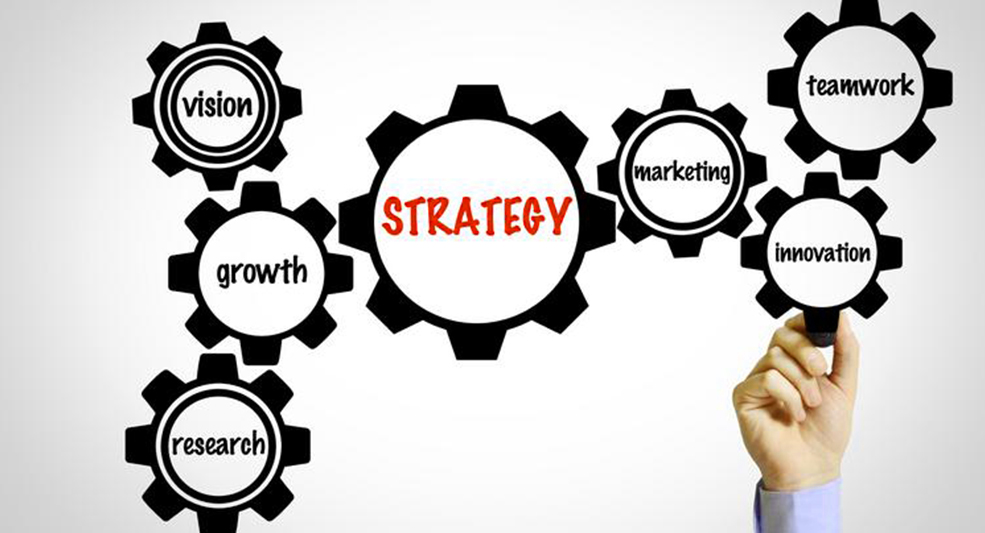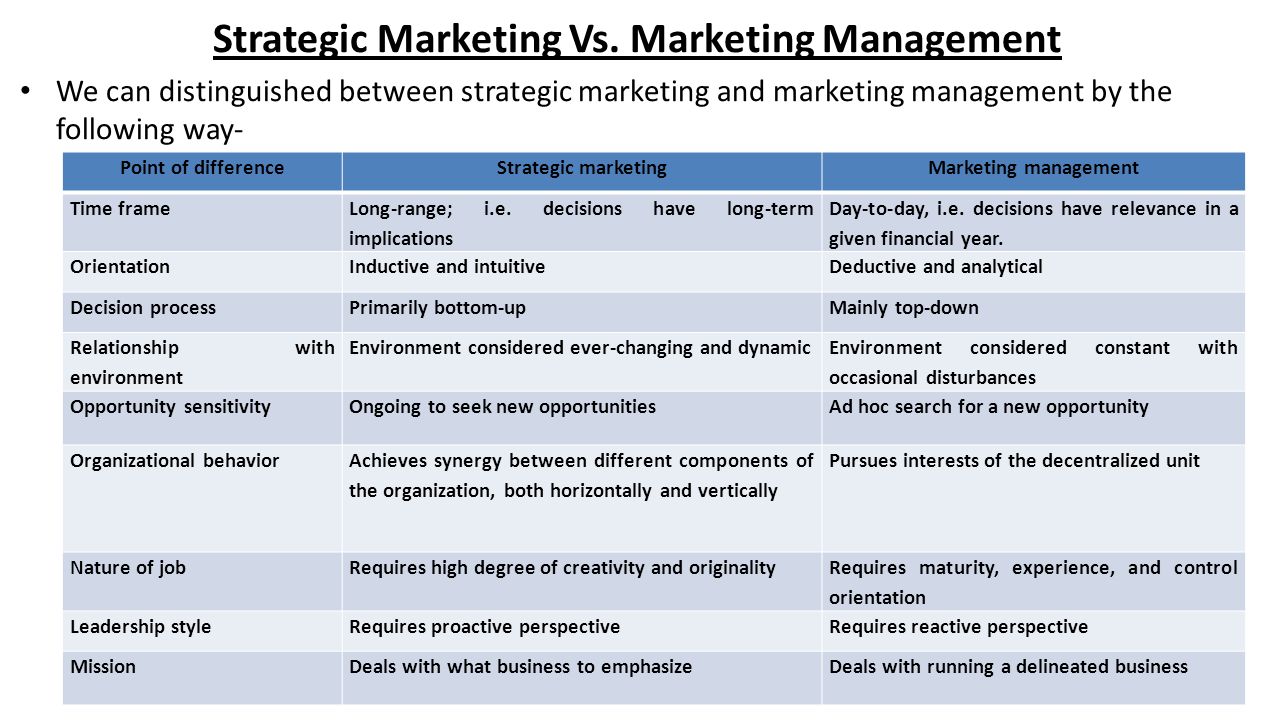Implementing strategic marketing is planning your marketing and management with clear goals, attention to detail, and data analysis.
It is the glue that binds all of your marketing efforts together so that they serve the main purpose.
The concept of marketing appeared in the 1950s and has continued to evolve ever since. With time, we have seen the emergence of different forms of marketing.
However, there was a common lack in each of them. The lack of strategic planning. Strategic marketing overcomes this obstacle. Read on to learn how, why, and when.
Who is this blog for?
- People searching for a comprehensive guide on Strategic Marketing.
- Those not getting desired results from their marketing efforts.
- Marketers and anyone looking for better marketing.
By better marketing, we mean marketing that understands customers’ vision and desires and connects with them. Marketing that does not try to convince but which provokes actions.
Marketing that can make things better. In short, marketing by humans for humans.
What is Strategic Marketing?

Strategic marketing involves an analysis before the launch of a new product or service. The main goal is to analyze a company’s marketing approach which is guiding all activity.
Its purpose is to identify the target and guide the company’s direction and marketing vision. Its in-depth analysis will make it possible to choose the appropriate segment and to propose an adequate offer.
Strategic marketing is
- Long term
- Documented
- Have Clear Objectives/Goals
- Purpose-driven
- More Effective Than Traditional
Why is Strategic Marketing Important?
Whether you like it or not, you have to do marketing to sell your product. But marketing is no longer about bludgeoning your audience with ads.
To succeed, you have to meet the needs of your clients and create followers.
For your marketing to be useful, first find your marketing problem by thinking over these points:
- Your company lowers its prices and it does not help
- Your customers are frustrated and let you know
- You feel like your new product or service launch is random
- Your current customers are not your ideal customers
- Your work is not rewarding
- Competitors are eating away your market
- Your SEO or social media strategy lacks impact
- You live on advertising (ex: Google Ads)
Once you find the problem, it’s time to do something about it.
Stop using ineffective tactics. Get off the social media merry-go-round. Stop spending too much money on advertising. Stop creating products or services, hoping to sell them at high prices.
It’s time for you to opt for human and ethical marketing that is strategic marketing.
Strategic marketing is about understanding how your customers want to feel and then creating the products and services that will help them feel the way they want.
 Strategic marketing is often considered unnecessary, sometimes even useless. However, it turns out to be a crucial element, in particular, because of the market analysis it provides:
Strategic marketing is often considered unnecessary, sometimes even useless. However, it turns out to be a crucial element, in particular, because of the market analysis it provides:
- It makes it possible to define the right strategy for the company.
- With analysis, it enables the company to adapt to the requirements.
- The more precise the analysis, the more the company will be able to propose a relevant offer for its customers, thus more are the sales.
- It offers a way to conquer a place above your competition.
The Purpose of Strategic Marketing
Mainly, strategic marketing aims to determine the marketing objectives of the company as well as its strategy. But, it goes further.
It allows you to :
- Anticipate and meet consumer expectations
- Increase business performance
- Anticipate and respond to changes in the marketing results
- Understand and capitalize on business strengths
All of these points aim to increase the turnover of the company.
Strategic Marketing vs Marketing Strategy
 Do not confuse strategic marketing with marketing strategy. Even if the terms are similar, the two concepts are very different:
Do not confuse strategic marketing with marketing strategy. Even if the terms are similar, the two concepts are very different:

Strategic Marketing
Strategic marketing is a type of marketing that defines the marketing objectives. It deals with product line strategy, corporate reputation, strategic planning and brand image.
Marketing Strategy
The marketing strategy has an overall vision of marketing at the level of the company. Therefore, within the marketing strategy, there are several types of marketing, such as operational marketing, relationship marketing, and even strategic marketing.
How to Create a Strategic Marketing Plan?
To create a strategic marketing plan, use these three main steps.
STEP 1 Business and Market Analysis
First, it is necessary to analyze the business environment, both internal and external. You can perform the internal analysis using the SWOT tool.
The SWOT tool makes it possible to determine:
- Strengths: where the company has an advantage over the competition
- Weaknesses: where the company is at a disadvantage compared to the competition
- Opportunities: the elements of the environment from which the company can take advantage (eg dissatisfied consumers)
- Threats: elements that could pose a problem for the company (eg competition)
SWOT analysis makes it possible to compare the strengths and weaknesses with the opportunities and threats that weigh on your company. And therefore to better understand your environment to make good decisions.
These four indicators are used to conduct internal analyses. The internal analysis focuses on the characteristics of your company, its strengths, and its weaknesses. The external analysis will identify the elements that constitute opportunities and threats for your business.
External Analysis – Market Analysis
It focuses on the needs and offers of the market to determine the sales potential of the product and the most interesting segments of the market.
This analysis takes into account the competition and its importance.
It offers the opportunity to fully understand the competition and to improve benchmarking (taking advantage of competitors’ best practices).
To analyze your market, you need to obtain data. In strategic marketing, data is sought from consumers or potential consumers.
Depending on what your company wants as data, it will be necessary to conduct different surveys:
Exploratory: The problems, hypotheses, and proposed solutions.
Qualitative: To obtain purchase motivations perceptions.
Description: To collect quantified data.
Experimentation: Experimenting with the subjects.
These surveys will also help you to understand unmet customer needs.
STEP 2 Define Objectives
 Second, you need to define the objectives. These are chosen according to the result of the analysis. Goals should be SMART: specific, measurable, acceptable, realistic, and time-bound.
Second, you need to define the objectives. These are chosen according to the result of the analysis. Goals should be SMART: specific, measurable, acceptable, realistic, and time-bound.
This will make it possible to define the strategy. It is the central element of the strategy since it influences the company’s image in the minds of customers.
Then you need to define the customer segment that the company wishes to target. For this, marketers generally use personas.
They search about their target customers and put themselves in their shoes and identify their expectations. For a very general target, marketers use segmentation of the audience.
STEP3 Choose Operation Tactics – Action Plan
 Arriving at this third stage of strategic marketing, you already have a clearer idea of your targets and objectives, your strengths and opportunities, as well as weaknesses and threats. So you can define your action plan.
Arriving at this third stage of strategic marketing, you already have a clearer idea of your targets and objectives, your strengths and opportunities, as well as weaknesses and threats. So you can define your action plan.
The last step is to decide the action plan to be put in place. This defines the actions to be taken to achieve the chosen objectives.
Note: Now is the time to decide whether or not to invest in more resources.
Your marketing action plans should revolves around the 4Ps:
- Product: Define the product around the target.
- Price: The purchase price, selling price, the margin, and the ROI.
- Promotion: Set of communication channels to use depending on target.
- Place (Distribution): Choice of distribution channels according to the target clientele and the results of the SWOT analysis.
The product policy consists of specifying the characteristics of the product. With the pricing policy, you will set its price. The distribution policy, on the other hand, determines the distribution channels to be used to promote the product. Finally, with the communication policy, you will define the communication strategies to promote your offer.
The choices made through these four policies allow your company to have a competitive advantage and to be successful.
As you may have understood, strategic marketing is an element of marketing that represents systematic planning and execution. It defines the axes to follow to conquer your target market and position your company.
This is the guiding line of the company, which will make it possible to make the best decisions to ensure its success. It is important to execute each of its steps well because your success and growth depend on them.
Major Highlights Of The Process:
- Strategic Marketing dictates the direction of the business.
- It is the foundation stone on which all marketing decisions are made.
- It is clear documented marketing strategy, which is guiding all the activities.
- The process is long-term in nature.
Evaluation of Your Strategic Marketing Implementation
Strategic marketing planning is a continuous process of making strategic decisions, implementing them, and committing to their effectiveness. Planning is adaptive, not fixed. So, strategic assessment is much more demanding than planning.
To be meaningful and effective, plans must contain commitments. Strategic evaluation aims to monitor performance and, if necessary, modify plans to keep performance on track.
Strategic evaluation includes:
- Searching for new opportunities and potential threats.
- Assessing changing conditions in business planning.
- Monitoring the performance of marketing strategies in use.
- Modifying the plans and tactics to keep performance on track.
- Creating Marketing controls.
Wrapping up on Strategic Marketing
Strategic planning is about defining your goals, determining where you want to take your business in the months or years to come. This means targeting a specific market. So you need to start by segmenting the overall market.
This segmentation will give homogeneous subsets of consumers with identical characteristics, therefore having the same needs and expectations. Strategic marketing strengthens your place in the market. And it improves the profitability and competitiveness of your business.
Got something to say about implementing strategic marketing?
Share it with us on Facebook, Twitter or LinkedIn.
General FAQs
What is Strategic Marketing?
By strategic marketing, we mean the implementation of a marketing strategy in line with the overall business strategy of the company. It encompasses marketing strategies that tend to realize the preliminary results of this overview.
Strategic marketing should be distinguished from operational marketing whose orientation is more focused on the short term.
How to implement a marketing strategy?
Generally, setting up a marketing strategy is divided into five main steps.
- Evaluation of market opportunities by carrying out a market study
- Target a certain pre-identified clientele
- Position the offer
- Set action plans what we call the “ marketing mix ”
- Control and revise the offer
The goal, above all, is to list, in detail, the means and actions likely to help you achieve your objectives, quickly and in the best possible conditions.
How to create and implement a small business marketing plan?
You should start with market research, both primary and secondary. It will give your marketing plan information about your target market customer profiles and understand how your product or service meets their needs. It also will identify your key competitors and what your target customers consider your competitors’ strengths and weaknesses.
What are the main stages of Strategic Marketing?
The development of strategic marketing involves three essential steps that determine its scope:
- Business and Market Analysis
- Goals and Objectives
- The Action Plan
What are the marketing controls in the marketing plan?
Marketing controls monitor your marketing plans as you implement them. The controls keep you updated on – if you are on the right track or you need to make some changes in your plan.
What is a marketing strategy?
A marketing strategy is an action plan to achieve a organization or company’s marketing objectives. A marketing strategy to be successful requires extensive market research.
What is the definition of strategic marketing?
Strategic marketing refers carrying out studies and analysis to better understand the market in which you operate. It also refers to all the techniques that help you to work on these analyses.
Through these studies, strategic marketing helps you define your marketing objectives and strategies. It is generally opposed to operational marketing.
Strategic marketing consists of reflecting on the action plans for the medium or long term. Operational marketing relates to short-term strategies. However, it stems from strategic marketing.
What is the main interest of strategic marketing?
The interest of strategic marketing lies in the studies intended to define your strategies. Of course, to be successful, you need to present the right offer to the right customers.
Strategic marketing studies aim to ensure the match between supply and demand. They allow you to diagnose problems, identify the main competitors and think about how to position yourself in the market.
You can identify the needs to be met and the target segments to conquer. And also, refine your strategy and offer according to the behaviors observed on the market.
What are the objectives of Strategic Marketing?
In general, strategic marketing aims to determine the marketing objectives to develop the company’s marketing approach on the basis of the results of evaluations and other specific analyses.
Other objectives:
- Establishment and consolidation of the company in its market.
- Definition of the company’s positioning in the minds of the target customers.
- Creation of a value responding to a specific need/expectation.
- Making the right choices relating to the company’s various strategies.
Your business is exceptional. Why isn’t your marketing like that?
Let us help you tweak your marketing!
Our marketing experts at WebSpero help you generate more web traffic, convert more leads, and close more sales. Our team knows exactly what it takes to build and maintain a proven marketing strategy that drives high-quality leads. For more information, see our marketing services or Contact Us to schedule a free consultation to discuss your needs and our services.
